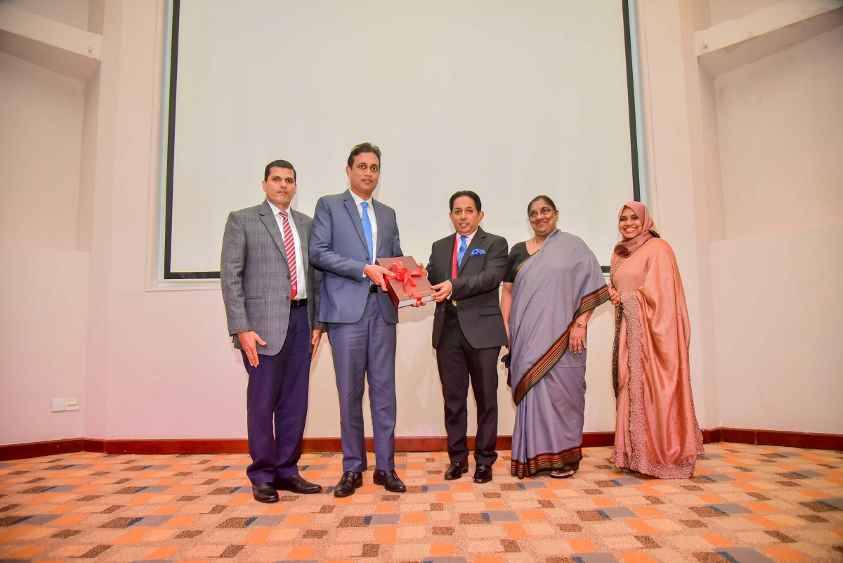
The 26th Annual Tax Oration, organised by the Institute of Chartered Accountants of Sri Lanka (CA Sri Lanka), examined the intricate relationship between tax policy, democracy, and the rule of law. Under the theme “Tax Conundrum, Democracy, and the Rule of Law,” Dr. Shivaji Felix, President’s Counsel, highlighted concerns that the Inland Revenue’s tax practices may overburden taxpayers without clear benefits. He argued that excessive taxation diminishes citizens’ spending power and may conflict with economic fairness.
Quoting the Organisation for Economic Cooperation and Development (OECD), he described tax as a “compulsory unrequited payment,” suggesting that taxpayers often see little return on their contributions, thereby raising questions about the system’s fairness. A key focus of his speech was the rule of law and its significance in taxation. Dr. Felix cited legal scholars such as Shimon Shetreet and Thomas Bingham, who connect the rule of law with judicial independence. He argued that for taxation to be fair, tax policy must be guided by the rule of law, fostering economic growth instead of imposing undue burdens.
The oration also addressed democratic processes in tax policy by showcasing Scholars Robert Dahl and Amartya Sen who had emphasised the need for accountability to prevent resource misuse within the mixed economy. In this context, the government’s ability to spend tax revenue with minimal oversight underscores the balance between planned and capitalist economic elements. Though it has modern applications, the rule of law traces back to Greek thinkers like Plato and Aristotle, later expanded by A.V. Dicey, who argued that government power should be limited by legal constraints to avoid arbitrary authority.
However, Dicey’s ideas have faced criticism with Economist F.A. Hayek arguing that the rule of law distinguishes free societies from authoritarian ones by binding government actions to predefined rules. Without such constraints, citizens risk losing their freedoms to arbitrary government decisions. Thinkers such as Sir Jeffrey Jowell and Lord Bingham have argued that the rule of law is essential for societal fairness, economic stability, and business confidence.
In Sri Lanka, the rule of law is foundational, as recognised by the Supreme Court. In Sampanthan v. Attorney General (2018), the Court reaffirmed that laws should be interpreted based on their clear intent, avoiding arbitrary enforcement. This framework applies directly to tax system analysis, underscoring the need for tax policies to be fair, transparent, and consistently applied.
Dr. Felix also discussed the complexities of tax reform. Drawing on insights from Bird and Oldman’s Taxation in Developing Countries, he explained that reform is not solely about revenue generation but also aims to manage macroeconomic policies, promote specific economic activities, and support social objectives. However, frequent tax changes discourage foreign investment, and a more stable approach may improve economic stability and trust.
Tax administration itself incurs costs, often relying on self-assessment. Tensions arise when Inland Revenue’s assessments seem arbitrary. While there is an appeals process, it can be costly for taxpayers, with high penalties and interest rates that often feel excessive. This process, previously managed by a Board of Review, has shifted to the Tax Appeals Commission and the Court of Appeal, which tends to favor Inland Revenue, raising concerns about fairness in these decisions for both taxpayers and the state.
Effective adjudication is essential, as judges are expected to impartially weigh cases, avoiding bias in favor of state revenue to protect Sri Lanka’s investment climate. The Inland Revenue Act (2017) exacerbated these issues by imposing high penalties (1.5% monthly) on overdue tax, while refunds accrue only 0.5% interest—an imbalance Dr. Felix deemed unfair and burdensome.
Another point of criticism was the withholding tax system, which often fails to credit taxpayers accurately. Errors in crediting withheld taxes have led to double taxation, underscoring inefficiencies that challenge fairness and the rule of law.
In closing, Dr. Felix argued that taxes should support economic justice in mixed economies but must respect the rule of law to be fair and sustainable. While the Inland Revenue Act (2017) may boost revenue in the short term, it is unsustainable for long-term prosperity. Echoing Churchill’s view, Dr. Felix emphasised that nations cannot tax themselves into prosperity alone.



